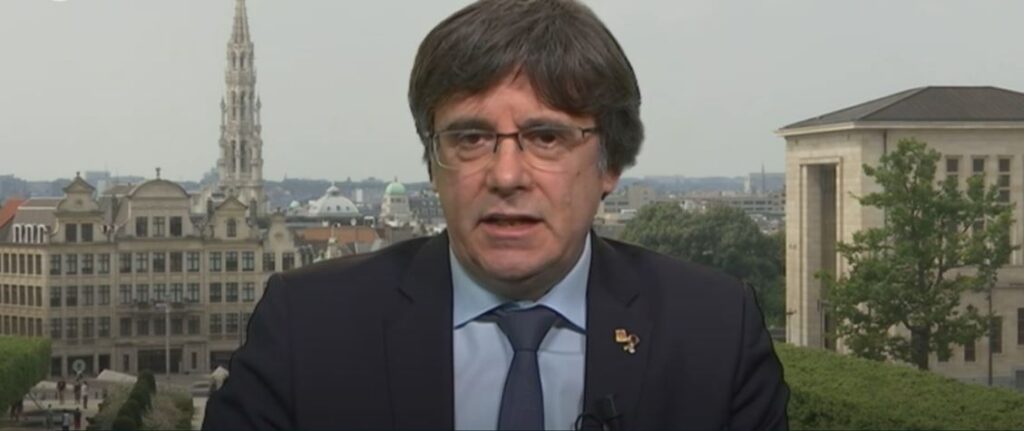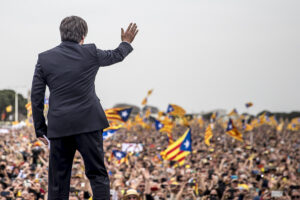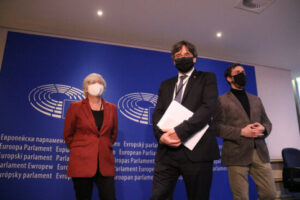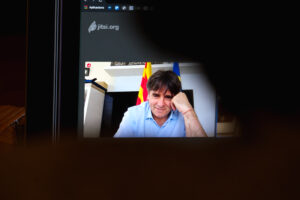03.03.2021 - 10:04
|
Actualització: 03.03.2021 - 11:04
It has been one year since Catalonia’s Council for the Republic staged a massive political rally in Perpignan, an event which saw president Puigdemont and ministers Comín and Ponsatí return to Catalonia for the first time since going into exile. A year on, VilaWeb looks back on the event through an online interview with the Catalan leader and we also discuss what has happened in these oddly intense twelve months.
—If you close your eyes and think back to the Perpignan rally, exactly a year ago, what picture does it conjure up for you?
—There are many. It was very intense. Politically, but also on a personal level. I recall seeing my mother and meeting my family again, being able to see them all together. I remember when we first arrived in Salses and we walked up to the Gate of the Catalan Countries. I felt the grass on the path, the soil, I got that scent … I can picture the crowd in the USAP rugby stadium. And, of course, I recall the moment when I walked on stage and saw the people that had gathered up front in droves. It meant that the people were alive and mobilised, and that there was a sense of unity that our exile hadn’t been able to wreck. There was a whole range of emotions.
—That day you explained that you felt it was very important for you to have come back not on the back of a deal with Spain or after being granted permission, but because you had earned it …
—We decided to go into exile to keep up the fight. We never consented to being removed from office, nor did we acknowledge that Spain’s courts of law had any right to persecute us like they have been doing. This is the very idea that has inspired all our actions to date and, therefore, being able to return to Catalonia was a very powerful symbol because it was the result of the work we had done in exile rather than a deal struck with Madrid, or the Spanish authorities looking the other way. It was a very powerful symbolic element.
—Would you call it a lesson?
—Well, the Perpignan rally showed that there is a way —albeit difficult and complex— that allows us to do what Madrid would never want us to. Perpignan showed that we can forge ahead without Spain’s permission.
—Your return happened just as your immunity as MEPs was recognised. A year later, there is a chance your immunity might be lifted.
—Indeed, we were able to travel to Perpignan because our parliamentary immunity shielded us from Madrid’s repressive, authoritarian efforts. Fortunately, some things are still sacred for European democracies. And we travelled to Perpignan despite Spain’s attempt to prevent us from running in the European elections. We knew from the start that they would request to have our immunity waived. In fact, the European arrest warrant (EAW) against us, which was filed without requesting permission from the European parliament after we had taken up our seat, is currently frozen in a Belgian court.
—So this is not a new move?
—Not at all! Technically speaking, I was arrested following the third EAW. So we knew this was bound to happen and obviously a majority in the European parliament would likely vote to have our immunity lifted. This was —and still is— a political matter and it is obviously a crucial one for Madrid. We knew they would exert all the pressure they could possibly muster, which is exactly what they’ve done.
—So, what now?
—First of all, we need to see how this will impact our work as MEPs. We will still be lawmakers and having an arrest warrant issued against us may affect the work we are doing. Spain’s warrant states that they must search for us until we “are located”, even though we appeared before a Belgian court and our whereabouts are well known to the authorities. If the request to lift our immunity is a ruse to hinder our work as MEPs, we won’t stand by. If they won’t allow us to travel to survey the migrant crisis in Greece or the covid situation in Portugal, for instance, they will be undermining our work as MEPs and abusing the rules that govern EAWs, something that we will naturally have to challenge in a court of law.
—Were you surprised at the lack of euphoria in Spain following the vote you lost in the parliamentary committee?
—To a point. Vox, Ciudadanos and the PP cheered as if they’d just won the Champions League. But, indeed, that can’t conceal the facts. Many MEPs across the board —obviously, not Spain’s— are sympathetic to the idea of an independence referendum for Catalonia and they are equally outraged by the crackdown, the prison sentences and exile. That’s the reason why, despite the pressure, the result of the vote was not the landslide victory that Spain was hoping for. They know that their position is being contested.
—However, that stems from a commitment to democratic values and it does not necessarily imply an endorsement of Catalan independence.
—Of course not. And that is what makes it even more important! In my opinion, the fact that people who do not support Catalan independence will stand up for our right not to be persecuted for supporting and advocating independence is much more important than the endorsement of those who share our political views. To me that’s the great value of European democracy. The Spanish MEPs would like to drag the European Parliament down to what you might call Spain’s democratic standards. Unfortunately, they’ve scored a partial victory. But, quite clearly, they cannot avoid eliciting some contestation, which they’ve been surprised by.
—Still, they seem to be in the lead at the moment.
—Yes. But even if we lose, we might end up winning.
—How?
—Well, we have achieved what was most important to us: the situation in Catalonia is on the agenda of the top European institutions and Madrid’s repression has been exposed. The pressure from Spain’s MEPs on their colleagues, harassing and leaning on them to scrape up every vote, has led to a greater awareness of what’s going on in Catalonia.
—How do you feel about Justice Pablo Llarena’s decision to resort to the Court of Justice of the European Union?
—It seems like a last-ditch attempt. At any rate, his decision to make a move before knowing the outcome of the parliamentary vote on our immunity is far from elegant.
—Do you still trust European justice?
—We always will, given that its institutions are largely immune to political pressure. They may rule against us, of course; but if they do so, it will be purely on legal grounds. On this point we have no concerns because, quite clearly, our rights in a European court are the same as anybody else’s. It is exactly the opposite in Spain.
—Let’s go back to the Perpignan rally. Many things have happened since. For instance, you’ve travelled to Northern Catalonia a lot. This is the region where you had worked as a reporter for El Punt. How did you experience the reaction of the people in Northern Catalonia?
—I am delighted to see that Northern Catalonia has finally got the justice it deserved. As a result of the whole thing, hundreds of thousands of Catalans south of the official border have either discovered the North or are now seeing it in a new, positive light. That was crucial and we all needed it. We shouldn’t turn our backs on each other just because there is an imposed political border separating Spain and France. It would be totally absurd. And it is only fair to acknowledge the resilience and great work put in by the people of Northern Catalonia, who have held the banner of their Catalan identity across the board in a way that deserves our admiration, indeed. The commitment of the community and the elected representatives of the political parties of every leaning, despite mounting pressure on all fronts, deserves our recognition and homage from the South. The rally we staged a year ago was the beginning of that. I am very happy to say that Catalans south of the border no longer look at Perpignan, at the North, condescendingly. Nowadays people are more aware that we need to support each other, like brothers do.
—The pandemic broke out right after the Perpignan rally. Did you ever imagine the extent of what was coming?
—As a matter of fact, the Perpignan rally was the last massive event staged in the EU prior to the breakout a year ago. Indeed, back then none of us could have imagined the impact that covid-19 would have on our lives and the world as a whole. It’s been just one year, but it feels as if it’s been a whole generation.
—Once I heard you talk about how you had experienced the pandemic and you said that, besides the obvious pain caused by suffering and death, as well as the economic and healthcare woes, you felt that the part played by technology was a silver lining and this is an issue that interests you greatly.
—This is an exceedingly satisfying reward, as far as I’m concerned. For the first time we staged a remote election campaign, ahead of the December 2017 polls. Then we attempted to vote in the new president remotely, too. Every step of the way, we have shown that technology is not a backup for politics, but the default, go-to choice. It is a choice that can help us to improve the management of today’s democracies to a huge extent, and to be much closer to the general public. At the time we received some criticism, not only from Spanish nationalists, but also from some on the pro-independence camp, who kept to the time-honoured Spanish motto: “let the others do the inventing”, a mindset that is at odds with Catalonia’s forward-thinking tradition. In contrast, we thought that Spain’s crackdown enabled us to take huge steps towards building more robust democratic systems based on technology. We took a lot of flak for that.
—They accused you of wanting to govern via Skype …
—Yes, they did. They said that about Skype. And they claimed that I lived in Matrix. They did say stuff like that. But, in actual fact, what’s happened is that all governments are running their country via Zoom. The Council of Europe, UN meetings, all that is being done remotely.
—This last year has also been very intense for the Council for the Republic. The Perpignan rally was its presentation in society. Do you think that today the Council is where you wanted it to be a year ago?
—No, it isn’t. A year ago we weren’t expecting a pandemic. For us the Perpignan event was the starting shot for the Council’s relaunch but, needless to say, the pandemic put a stop to all that. So we’ve had to reinvent ourselves, much like everyone else, actually. Considering the circumstances, we are very pleased with the way we have adapted. Local Councils, for instance, have expanded, playing an important role during the pandemic. The consensus built around Preparem-nos [“Let’s Get Ready”, a strategic paper] and the rollout of our app laid down a very solid base.
—Yet Catalans aren’t joining the Council. Why do you think that is?
—I think there are many factors that account for that. Obviously, the lack of sympathy [for the Council] from certain political spaces does not help. Furthermore, joining the Council is a militant decision in a context of confrontation and at a time when Madrid’s crackdown hasn’t eased off and some in Catalonia’s independence movement are not holding their ground. The Council’s woes are the same ones that trouble the independence movement as a whole. It is not an exception, but a reflection. And in order to address this impasse which has been going on for too long we ought to ask ourselves why this is happening.
—Is the breakaway strategy outlined in Preparem-nos your answer to the political impasse?
—Preparem-nos [“Let’s Get Ready”] means, above all, that we are not ready yet. And we need to do our work and get ready for a time that we know will come. If Spain behaved like a democratic state and agreed to discuss a self-determination referendum, Preparem-nos would be unnecessary. Or it might be the Catalan government’s job. However, we are certain that Spain will never agree to go down that road and, therefore, we must be prepared to follow the only available path, if we wish to be an independent country. That is, we need to manage a conflict of legitimacies with Spain in an intelligent manner. Preparem-nos calls on everyone to get ready for that moment in their own sphere.
—Hasn’t that idea been rendered invalid with the election result, now that ERC has one seat more in parliament than Junts, your party?
—I believe that the election result has confirmed that, effectively, we have a tie. It has also shown that the pro-independence parties that advocate a break-up [with Spain in the short term] have received more support at the polls than those who do not. All of that means some fine balancing is needed. I believe that the Catalan people have asked us to manage the complexity represented by this result. I believe that the public have told us that the various strategies within the pro-independence bloc are compatible.
—Are they?
—I won’t take issue with anybody who suggests holding talks with Madrid, but I also feel that this strategy cannot be extended indefinitely and can’t be an excuse not to get ready for the day when all of us will be persuaded that Madrid will never engage in talks. And to take the decisions that we will need to take at that time.
—Last Friday marked the first anniversary of the meeting of the Taula de Diàleg [“Table of Dialogue”, an attempt to hold bilateral talks between the Catalan and Spanish governments]. They’ve never met again since and at one point they even claimed that the covid crisis made it impossible.
—Isn’t it peculiar that everyone has been holding meetings online, every government, every institution, but this is the only one that has failed to do so? Clearly, they lacked the will to follow it through, but the aims were also absent. It surprised me that those who masterminded the talks haven’t even mentioned the anniversary a year on. They haven’t even attempted to celebrate the momentous date which they claimed would change relations between Catalonia and Spain.
—In light of what’s happened in the last year, has your opinion of PM Pedro Sánchez changed at all?
—When he was elected I warned that the man had no principles and was not to be trusted. That opinion was the cause of some headaches and Pedro Sánchez found voices who sang his praises, even on the secessionist camp. Well, now everybody knows that Mr Sánchez is not a man of his word. That’s not just my opinion, by the way. Barcelona mayor Ada Colau said so, on the subject of setting caps on rents. Someone as untrustworthy as him can offer no guarantees whatsoever.





